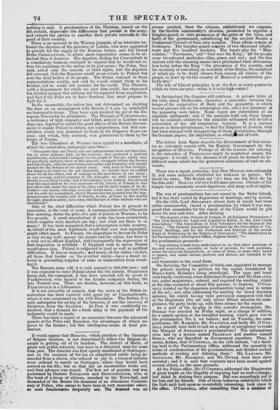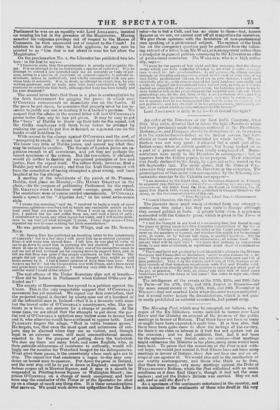The war of proclamations has not ceased in the Sister
Island, but it has been varied by dispersions of meetings, and by arrests.
On the 13th, Lord ANGLESEY, whose feats in words had been rather unsuccessful, issued a proclamation by which it was sup- posed that assemblies for the repeal of the Union would be put down for ever and ever. After noticing " 'The Society of the Friends of Ireland, of all Religious Persuasions e `The Irish Society for Legal and Legislative Relief, or the Anti-Union Association,' `The Association of Irish Volunteers for the Repeal of the Union,' `The General Association of Ireland for the Prevention of Un- lawful Meetings, and for the Protection and Exercise of the sacred Right of Petitioning for the Redress of Grievances,' `The Subscribers to the Parliamentary Intelligence Office, Stephen Street,' "— the proclamation 'proceeds- " And whereas it hath been made known to us, that other meetings of the said association, assembly, or body of persons, for such purposes, under the aforesaid designations, or some of them, or some other name or names, and under various pretexts and devices, are intended to be held"— and terminates in the usual form.
On Saturday, the Committee of thirty-one, appointed to manage the general meeting to petition for the repeal, breakfasted at Haye's hotel, Holmes's being interdicted. The eggs and toast were hardly swallowed, when Alderman D ARLEY and Mr.GREAVES, two police magistrates, entered, and required the meeting, which at the time consisted of about fifty persons, to disperse. O'Cosr- NELL insisted on the dispersion proclamation being read in terms of the act ; and, after addressing the meeting for about fourteen minutes, his watch having been previously compared with that of the Magistrate (the act only allows fifteen minutes for com- pliance), the party broke up, with three cheers for the repeal. As a part of the by-play in this comalie larmoyante, Mr. STEELE was arrested on Friday night, on a charge of sedition, for a speech spoken at the breakfast meeting, which gave rise to the proclamation No. 3, we believe ; and on Tuesday, the same gentleman, Mr. BARRETT, Mr. STAUNTON, and lastly Mr. O'COM: NELL himself, were held to bail on a charge of conspiracy to evade the Marquis of ANGLESEY'S proclamations ! The informations were laid by a person named FRANKLIN and another named SNELL; who are described as Government reporters. They, it seems, declare, that O'CONNELL, on the 10th instant, "at a meet- ing held in the Parliamentary Office, 'addressed the assembly in terms of condemnation of the proclamations, and detailed several methods of evading and defeating them." Mr. LAWLESS, Mr. REYNOLDS, Mr. REDMOND, and Mr. DWYER have been since arrested ; and it is said that -Warrants have been issued against several others, on the same grounds.
At the Police-office, Mr. O'CONNELL addressed the Magistrates at great length on the illegality of requiring bail on such a charge; but failed in shaking their purpose. Bail was accordingly put in for him and his friends. One of those ludicrous exhibitions which the Irish mob look upon as wonderfully interesting, took place in the office. O'ComvaLL, after remarking that RS a member of Parliament he was on an equality with Lord ANGLESEY, insisted on wearing his hat in the presence of the Magistrates. Having asserted his vulgarian privilege out of respect to the House of Commons, he then uncovered out of respect to the Court ! In addition to his other titles to Irish applause, he may now be pointed to as " him that is not afraid to wear his hat afore the Magistrates.'
On the proclamation No. 4, the Liberator has published two let- ters : in the first he says-
" I fearlessly state, that this proclamation is grossly and palpably ille- gal. It is an attempt to fix on individuals a species of outlawry. It is an attempt to extend a law intended only for an assembly or body of per- sons, acting in a species of corporate or general capacity, to private in- dividuals, acting as individuals, and wholly unconnected with any pre- vious body or assembly. It is, in short, an attempt to violate law, by per- verting grammar, and to make men who have constituted a body still continue to constitute that body, although that body has been totally and for ever dissolved."
The second letter hints that-there is a plan in contemplation by the Irish Government for gagging the press ; in which case O'CONNELL recommends an immediate run on the banks. If the press be put down, he considers that property must be too in- secure to justify any one in trusting it to a banker's promise. "We suspect that the advice in the second letter will test O'CONNELL'S power better than any he has yet given. It may be easy to get the " boys " of Dublin to throw up their hats for the repeal, but the thrifty shopkeeper will think twice before he attempt by realizing one pound to put five in hazard, as a general run on the banks would doubtless do.
With respect to the charge against O'CONNELL and the rest, of "conspiring to evade," it seems too absurd for grave discussion. We know very little of Dublin juries, and cannot say what they may be induced to swallow. The throats of London juries are ca- pacious enough in all conscience, and yet they are perhaps the fairest specimens of the system. But the conviction, if obtained, would go farther to destroy all recognized principles of law and justice, than the repeal itself. We rather think, however, that a Dublin jury will not convict ; and thus the Irish Government will have the consolation of having attempted a great wrong, and been laughed at for the attempt. A meeting of the inhabitants of the parish of St. Thomas, Dublin, took place on Monday,—Mr. HENRY GRATTAN in the chain—for the purpose of petitioning Parliament for the repeal. Mr. GRATTAN wore a tricolour scarf—orange, green, and white. The resolutions were of course carried unanimously. O'CONNELL made a speech on the " .Algerine Act," in his usual serio-comic style. I awoke this morning," said he, " resolved to begin a week of more strenuous agitation—resolved not to touch any exciseable article in Ire- land until that act ceases to exist. When I went up stairs to break- fast, I pushed the tea and coffee from me, and took a bowl of milk ; I resolved not to touch any other liquor but water, and I will advise Irish- men to use that [of what strength ?] alone. I have dote more—I have repeated my vow to wear nothing but Irish manufacture."
He was peculiarly severe on the Whigs, and on Mr. SPRING RICE.
" Mr. Spring Rice has published an insulting letter to the inhabitants of Limerick ? but in a few days I will serve him up as minced !aground ?] Rice—I will make him stewed Rice. I tell him he was glad to write to me to go down to assist him in carrying his last election. I went down there at one in the morning. Before four, one of his committee came to call me out of bed, to thank me for coming down to support Rice, and to tell me that Rice was gone if the people continued to take bribes. The people did not care which got in, so they -thought they might as well make money by it. I had a better opinion of Rice then than now. God forgive me for it ! but the Corporation was with Dixon, and I have never any great fancy for corporations. I could say very little for Rice, but I said the worst I could of the others."
The real offence of the Under Secretary slips out at length- " How did he behave in Parliament when Colonel O'GRADY de- fended me ?
The county of Roscommon has agreed to a petition against the Union. This is the only respectable support that O'CoN:vaaa's movement has yet received. We repeat our firm conviction, that the projected repeal is decried by ninety-nine out of a hundred of
all the influential men in Ireland—that it is a favourite with none but the lowest order of O'CONNELL'S countrymen, who, like pa-
tients in a fever, are anxious for a change of position. At the same time, we are afraid that the attempts to put down the par- tial evil of O'CoNNEeis agitation may incline some to favour him and it, who otherwise would have continued to oppose both. Lord
PLUNKETT forgets the adage, " Ruit in vetita humane genus." He forgets, too, that even the most quiet and submissive of sub- jects may be alarmed when they see so violent, and, though
legal in an extreme sense, still most unconstitutional means, resorted to for the purpose of putting down the turbulent. We dare say there are many Irish, and some English, who, in their patriotic abhorrence of resistance to authority, would wil- lingly see the member for Waterford hanged for his delinquencies. What gives them pause, is the uncertainty where such opts are to stop. The unjust law that condemns a rogue to-day may con- demn an honest man to-morrow. Put down the press in Ireland, and the next step will be to put it down in England; suspend the
habeas corpus act in Merrion Square, and it may in a month be suspended in Printing-house Square or Wellington Street; im- prison O'CONNELL on a charge of mock conspiracy, and how soon may the conductor of the Times or of the Spectator be shut up on a charge of mock any thing else. It is these considerations that move us. We could Work down our sydipathies for the Libes rator—he is but a Celt, and has no claim to them—but, honest Saxons as we are, we cannot cast off all sympathies for ourselves. We give these opinions with the hesitation of hon-professional men speaking of a professional subject. The opinion of the Irish bar on the conspiracy question may be gathered from the follow- ing extract of a letter from Mr.WALeAcs,an opponent rather than a coadjutor in ge.neral politics; conveying to the Liberator an offer of professional assistance. Mr. WALLACE, who is a high autho- rity, says— "I learn by the papers of last night and this morning, that the eharee under which you were yesterday arrested is, for what is called a ei,,t6- racy to evade the late proclamations. In my opinion, the charge. savours strongly of illegality and oppression,—and in this view of your case, if my very feeble professional aid can be of use in your defence, I shall most cheerfully give it ; with sincere respect for Lord Anglesey personally, and a wish to support his Government even against you, so long as it is con- ducted on principles of law and eonstitation, his Lordship seems to me to have violated both in his proceedings on the unlawful assembly act. Those proceedings are, by the act, those of the Lord Lieutenant akne, and it is therefore the less presumptuous to suppose they may be erroneous. To me it appears that he has misappplied that law to cases to which it was not applicable, and has strained it in his proclamations, particularly she last, to an extent which e-eselly endangers public liberty."
Lord ANGLESEY is fairly in for it—God defend the right!



























 Previous page
Previous page